White House Again Clarifies Biden on Remarks about Protecting Taiwan
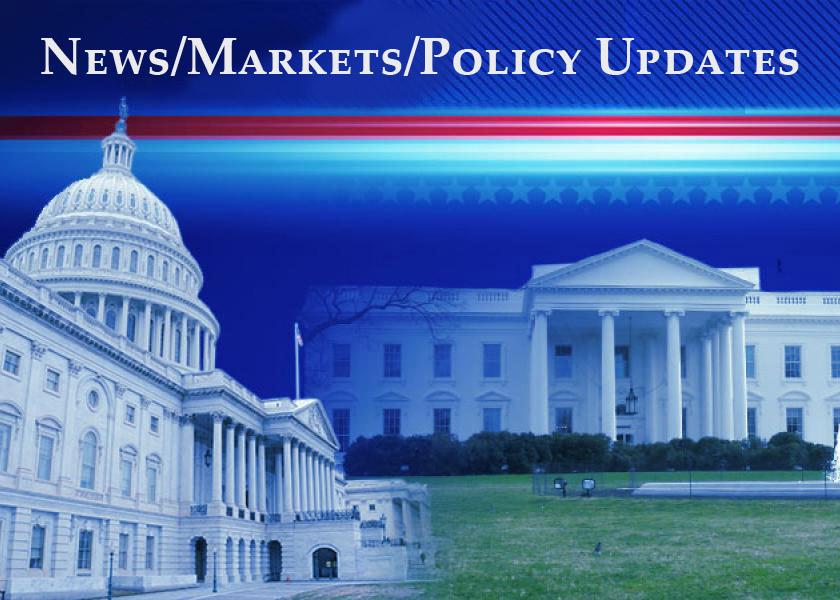
Cotton analyst questions USDA projections
|
Biden: U.S. would defend Taiwan if attacked by China. |
Final farewell |
Putin under fire |
|
In Today’s Digital Newspaper |
USDA daily export sale: 136,000 metric tons of soybeans to China during the 2022-2023 marketing year.
Ukraine has captured more territory in one week than Russian forces had in five months, observers say. The recent gains by Ukrainian troops, particularly in the eastern part of the country, have forced Russia to regroup amid a series of shortcomings -- which will get no easier with the onset of winter. Russians currently hold about 20% of Ukrainian territory, including Crimea and parts of the south.
Ukraine wants the U.S. to send more powerful weapons, but President Biden wants to avoid provoking Russia at a moment when American officials fear Vladimir Putin could escalate the war to compensate for recent losses, according to the New York Times.
BlackRock’s CEO offers to help Ukraine’s economy. Larry Fink met via videoconference with President Volodymyr Zelenskyy to discuss how his money management giant could help create an economic reconstruction fund for Ukraine. An important task for Ukraine “is to achieve victories in the economy as well, and to be an attractive country for investors,” Zelenskyy said.
The European Union ramped up financial pressure on Hungary’s nationalist prime minister just as it needs his support to extend sanctions on Russia over its invasion of Ukraine. The European Commission on Sunday proposed freezing €7.5 billion, equivalent to $7.51 billion, in EU payments for Hungary.
Britain says farewell to Queen Elizabeth II. The state funeral for the late monarch began this morning, with President Biden and other world leaders in attendance. Businesses in Britain were largely closed, a broad economic pause that economists say could help to tip the nation into recession, at least technically.
President Biden vowed the U.S. military would defend Taiwan from an "unprecedented attack" by China, while distancing himself from questions about the island's independence. It didn’t take long for the White House to issue a clarification.
Pessimism about China's economy despite better-than-expected economic data last week. Investors aren’t so confident in the superpower’s ability to bounce back from the self-inflicted harm caused by the government’s so-called zero-Covid policy, among other issues. More in China section.
The Wall Street Journal reported that U.S. bank regulators are considering new rules to require large regional banks such as U.S. Bancorp, Truist Financial and PNC Financial Services Group to add to financial cushions that could be called on in times of crisis.
The U.S. dollar is experiencing a once-in-a-generation rally, a surge that threatens to exacerbate a slowdown in growth and amplify inflation headaches for global central banks. Details below.
Bitcoin sank toward its lowest level since 2020 on angst over hawkish central banks.
Gold is down nearly 8% so far this year, on pace for its worst annual performance since 2015.
Eight House Democrats ask Biden to continue oil reserve releases. Details in Energy section.
How electric vehicles took off. A few years ago, auto executives weren’t sure there would be enough buyers for plug-in electric models. Now, they worry they can’t build them fast enough, while they intensify a multibillion-dollar rush to accelerate timelines and bring factories online. Details in Energy & Climate Change section.
On the trade policy front, USTR Katherine Tai made some comments on several issues, but she didn’t reveal much if any news on those topics. See Trade Policy section.
After months of turmoil, violent protests have engulfed Haiti again after Prime Minister Ariel Henry announced he would impose painful fuel price hikes last week — frustrating a population already grappling with soaring costs of living and political instability. Thousands of Haitians took to the streets to protest the move and call for Henry’s resignation, in an outpouring of anger that underscores the grim state of Haiti’s living conditions.
The entire island of Puerto Rico lost power after being hit by Hurricane Fiona, according to its governor, Pedro Pierluisi. Joe Biden allowed the immediate release of federal resources for relief efforts (which were botched after Hurricane Maria in 2017).
“The pandemic is over. We still have a problem with Covid.” — President Biden, in an interview with CBS’s “60 Minutes.” That will not bode well for Democrats wanting to put $22 billion in a stopgap spending bill for more Covid funding.
NPPC lists its top agenda items for Congress. Details in Livestock section.
Election Day 2022 is 49 days away. Election Day 2024 is 778 days away.
|
MARKET FOCUS |
Equities today: Global stock markets were mostly lower overnight. U.S. stock indexes are pointed to lower openings and at or near two-month lows. With inflation stubbornly high, investors are bracing for the Federal Reserve to raise interest rates by three-quarters of a percentage point this week. In Asia, Japan closed. Hong Kong -1%. China -0.4%. India +0.5%. In Europe, at midday, London closed. Paris -1.4%. Frankfurt -0.7%.
U.S. equities Friday: All three major indices finished lower Friday, capping off a week that saw the Dow fall 4.1%, the Nasdaq was 5.5% lower and the S&P 500 declined 4.8%. On Friday, the Dow fell 139.40 points, 0.45%, at 30,822.42. The Nasdaq fell 103.95 points, 0.90%, at 11,448.40. The S&P 500 lost 28.02 points, 0.72%, at 3,873.33.
FedEx's stock plunge on Friday marked the biggest daily percentage loss in its history. The company's dismal outlook sparked fresh worries among investors about an economic slowdown.
The S&P 500 has closed below its 200-day moving average for 111 straight sessions, according to FactSet, on track to double the length of its next-longest recent streak. This figure is a widely watched technical indicator used to gauge longer-term price trends.
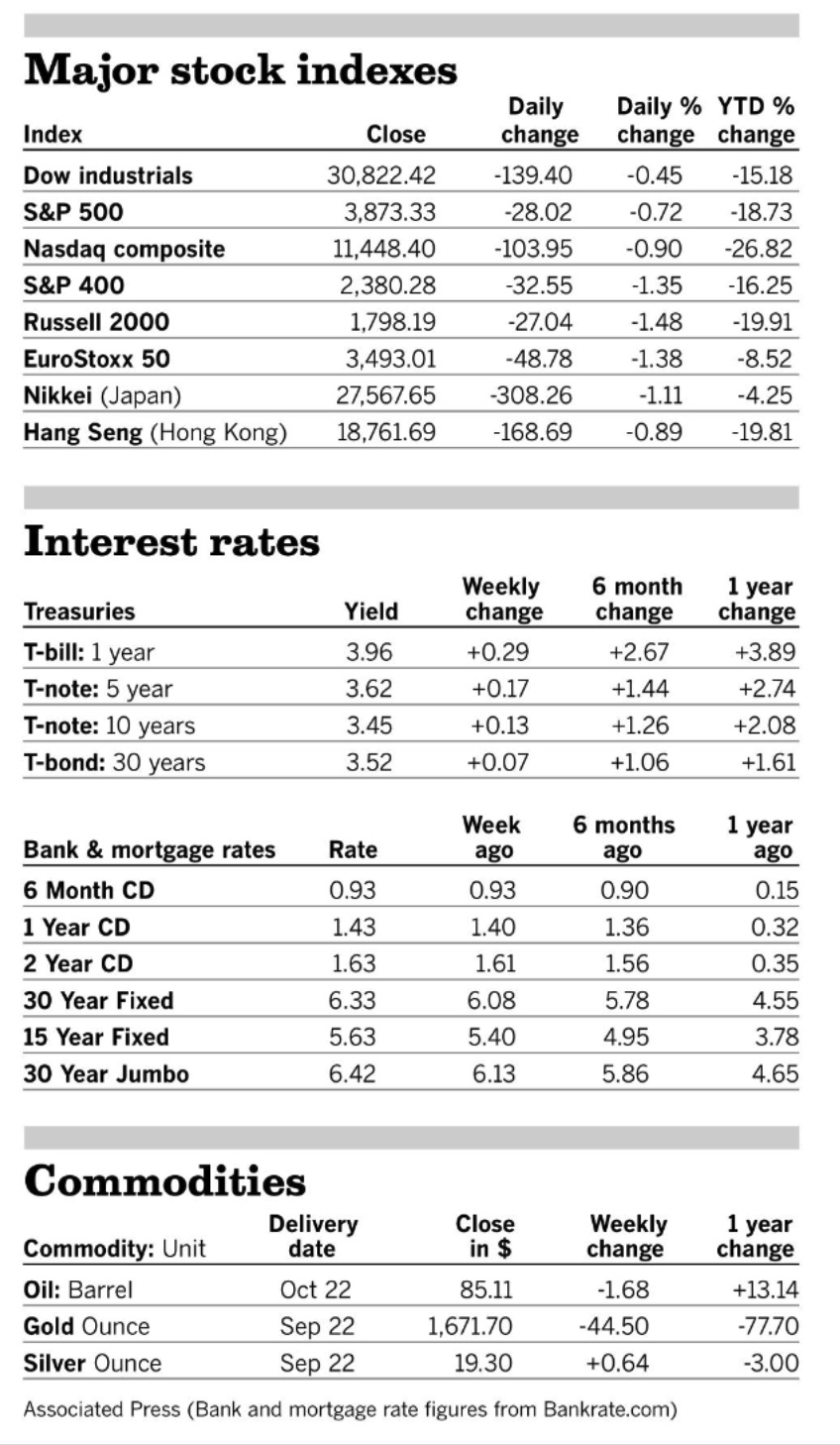
Agriculture markets Friday:
- Corn: December corn futures fell 1/4 cent to $6.77 1/4, down 7 3/4 cents for the week.
- Soy complex: November soybeans fell 3 cents to $14.48 1/2, still up 36 1/4 cents for the week. December soymeal fell $4.90 to $429.60, while December soyoil rose 166 points to 65.96 cents.
- Wheat: December SRW wheat rose 14 3/4 cents to $8.59 3/4, down 9 3/4 cents for the week. December HRW wheat gained 9 cents to $9.35 1/4, up 6 cents for the week. December spring wheat rose 10 cents to $9.38 3/4.
- Cotton: December cotton fell 400 points to 99.29 cents, the lowest close since Aug. 9 and 555 points lower on the week.
- Cattle: October live cattle futures fell 12.5 cents to $145.50, down 17.5 cents for the week. October feeder cattle rose 32.5 cents to $181.25, down $4.325 for the week.
- Hogs: October lean hogs rose 85 cents to $96.90, up $3.725 for the week. Futures closed at a four-week high on signs the cash market has bottomed. The CME lean hog index rose 19 cents to $97.77 (as of Sept. 14), up from a seven-month low earlier this week, and today’s index is expected to gain another 20 cents.
Ag markets today: Heavy pressure on the wheat market pulled corn lower overnight, while soybeans posted two-sided trade. As of 7:30 a.m. ET, corn futures were trading 2 to 3 cents lower, soybeans were narrowly mixed, winter wheat was 15 to 17 cents lower and spring wheat was mostly 7 to 11 cents lower. Front-month crude oil futures were more than $2 lower and the U.S. dollar index was around 225 points higher this morning.
Technical viewpoints from Jim Wyckoff:
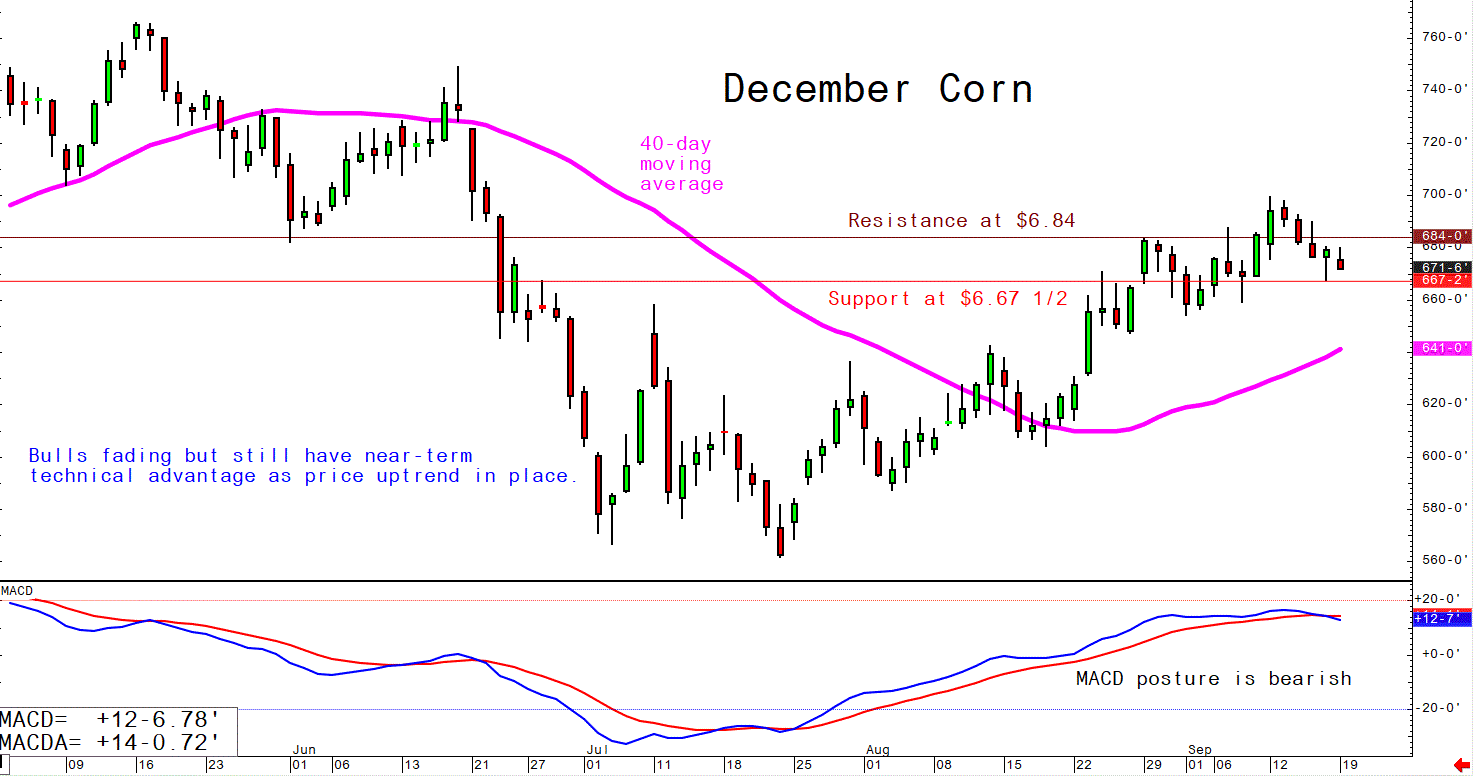
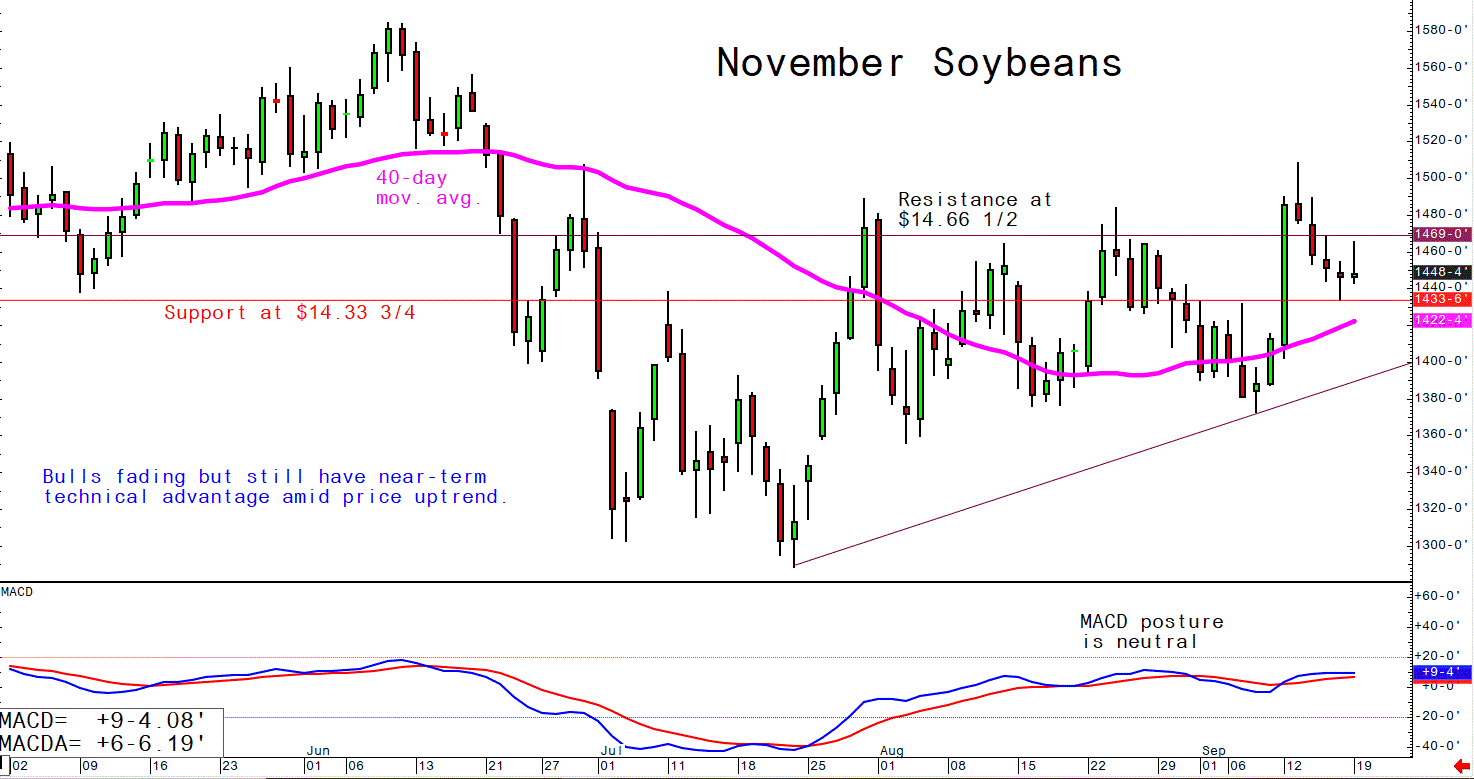
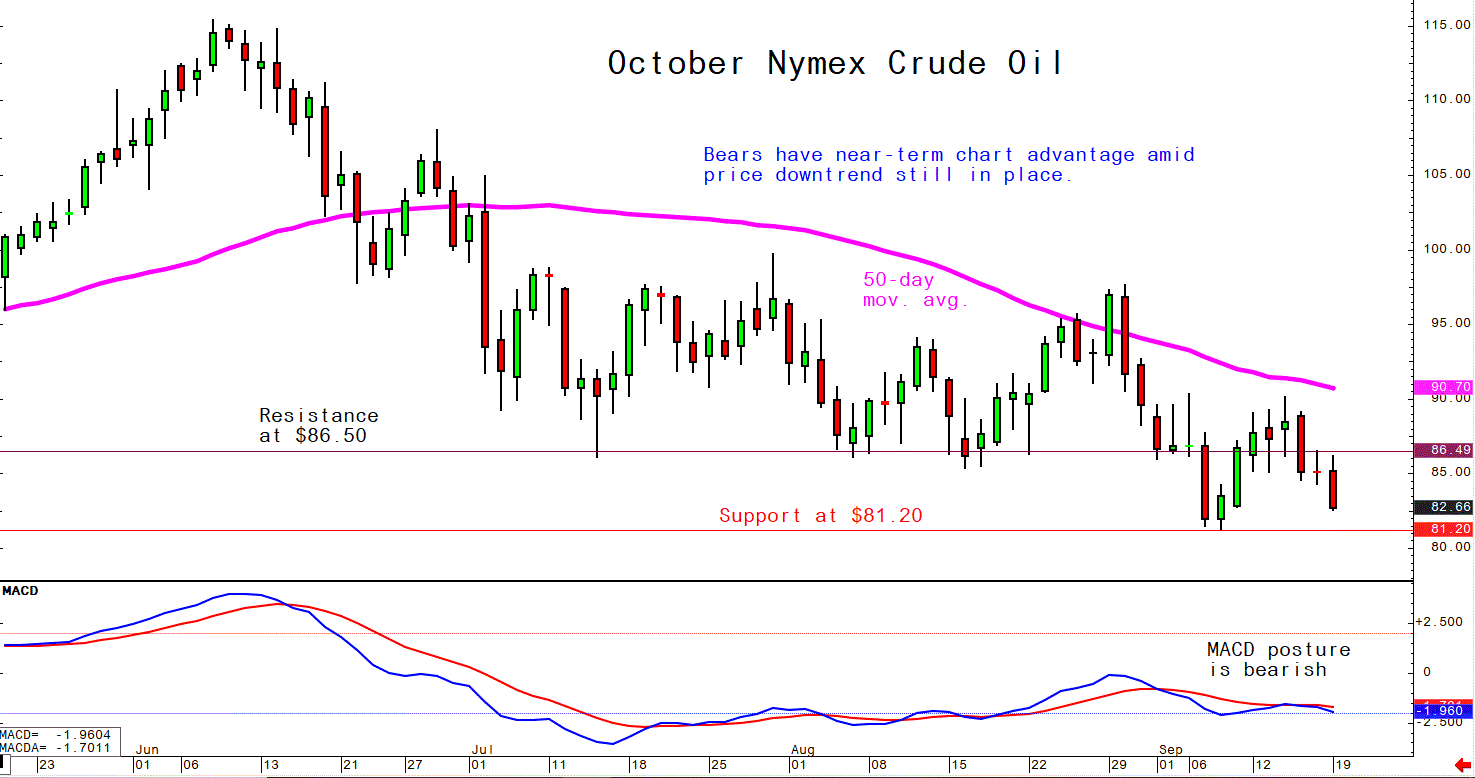
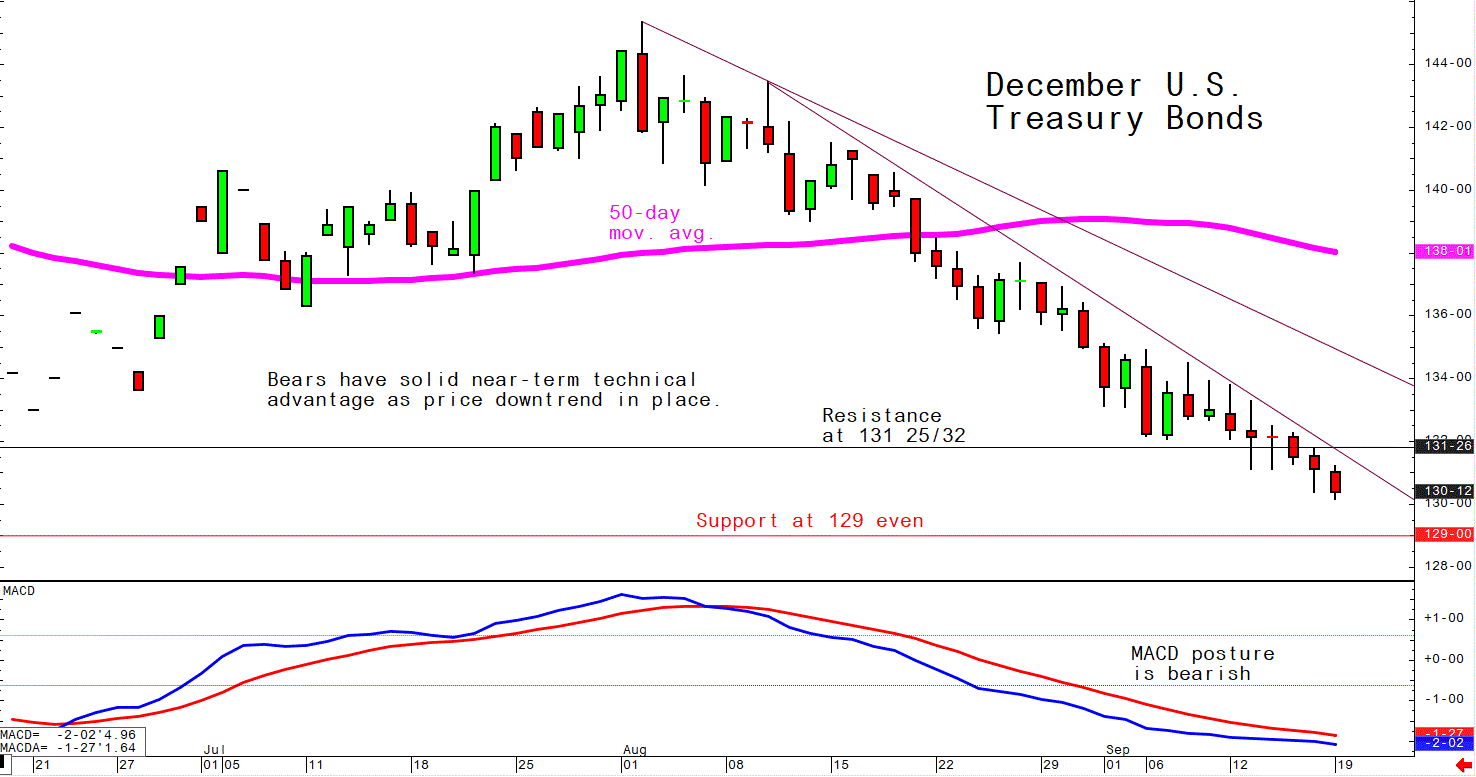
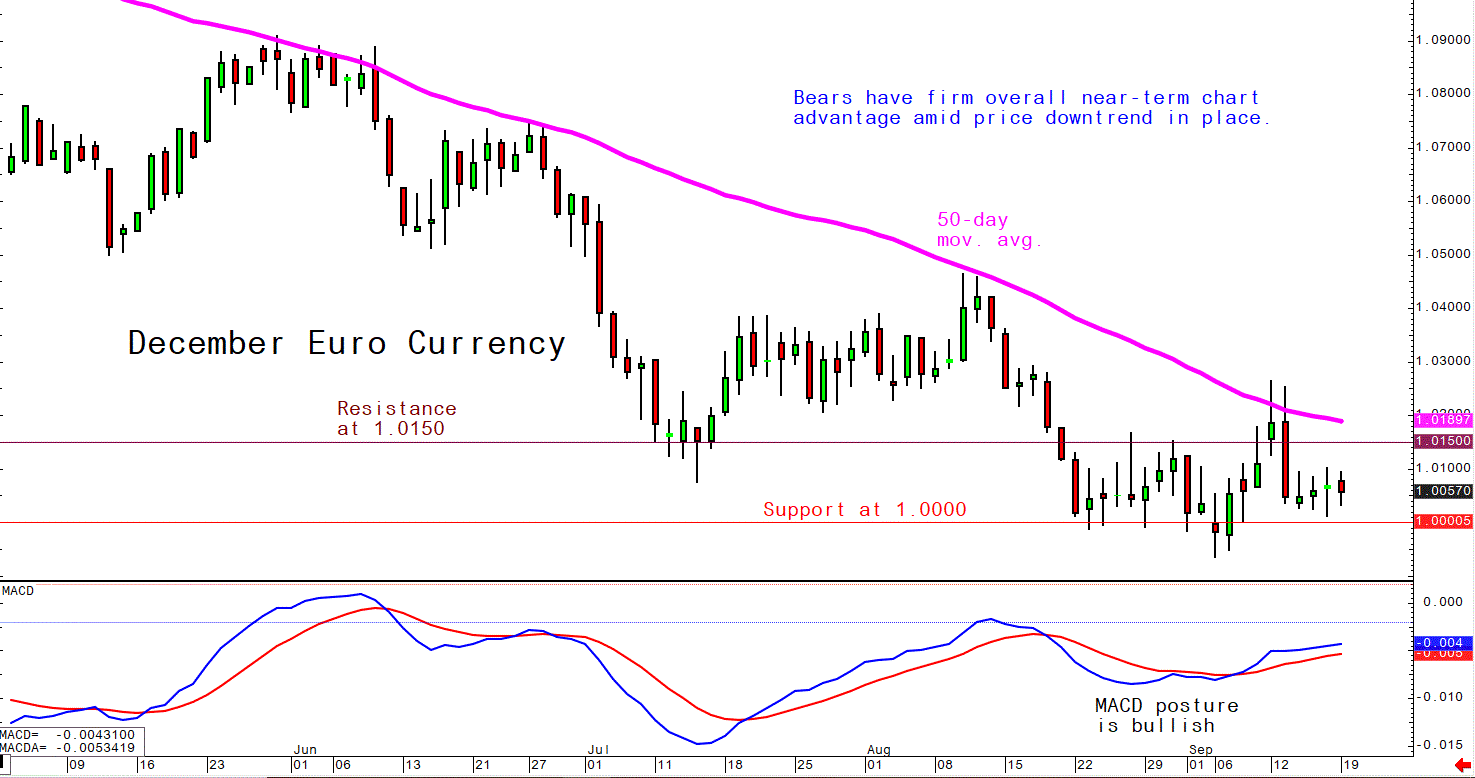
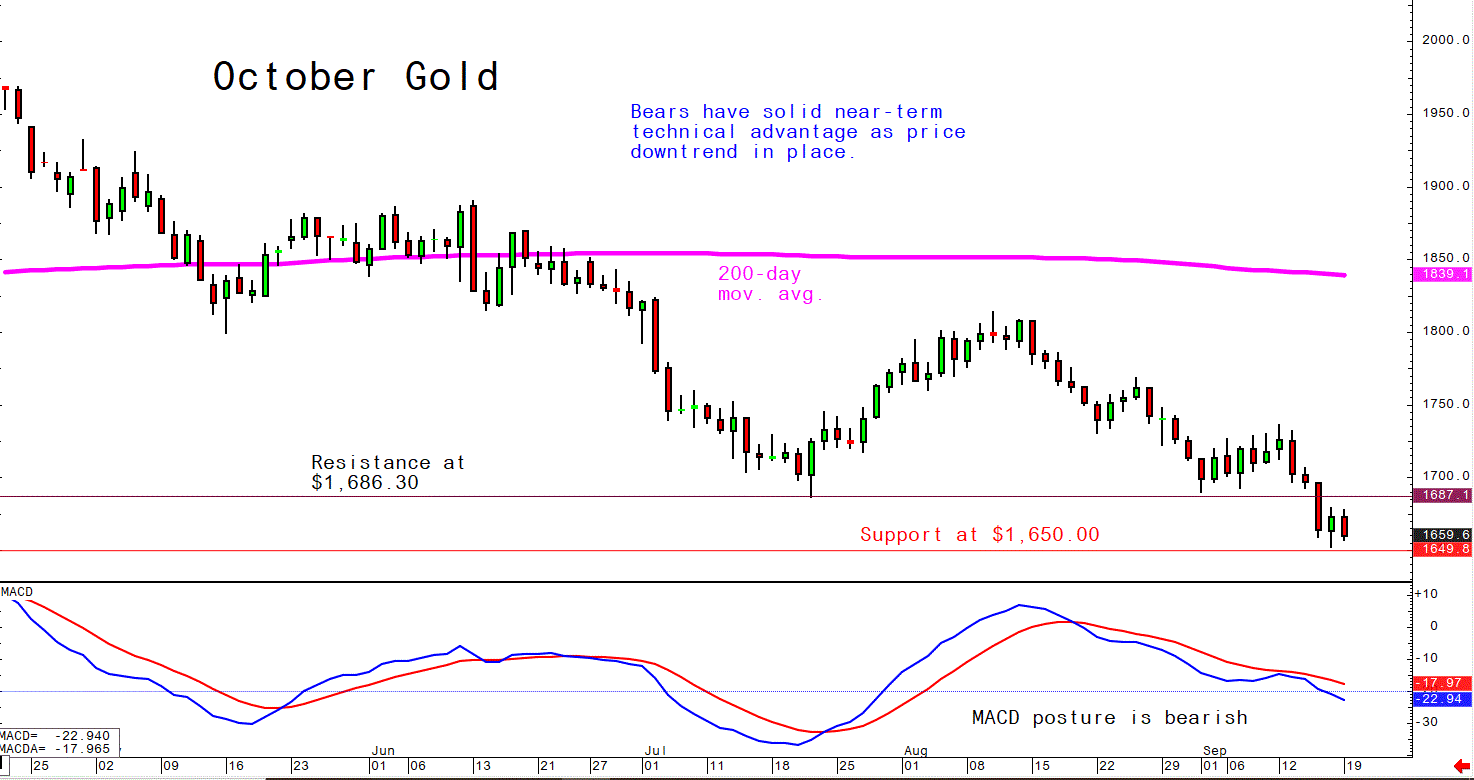
On tap today:
• National Association of Home Builders housing market index is expected to fall to 47 in September from 49 one month earlier. (10 a.m. ET)
• USDA Grain Export Inspections report, 11 a.m. ET.
• USDA Crop Progress report, 4 p.m. ET.
• Japan's consumer price index excluding food for August is expected to increase 2.7% from one year earlier. (7:30 p.m. ET)
• World leaders are gathering in New York this week for the 77th session of the U.N. General Assembly, where high-level discussions and meetings are expected to focus on Russia’s invasion of Ukraine, as well as climate change and the ongoing energy and food crises. All attending leaders are required to speak in-person, with one special case: Ukrainian President Volodymyr Zelenskyy, who was granted an exception.
• World Bank President David Malpass addresses the Economic Club of New York.
• ECB's Luis de Guindos speaks in Madrid.
• OECD launches its 2022 States of Fragility report, examining the impact of crises around the world.
More U.S. consumers are accruing credit-card debt for longer periods as inflation and rising rates bite, a survey showed.
- Some 60% of debtors say they have owed money on their cards for at least a year, up from 50% a year ago.
- Young consumers in their 20s and 30s, plus those in the lowest income brackets, are more likely than older generations to carry a balance to cover expenses like groceries, utilities and child care.
- Still better than 2019. For now, at least. Total balances remain slightly lower than before the pandemic, though rising rates and a softening economy may lead to higher delinquencies.
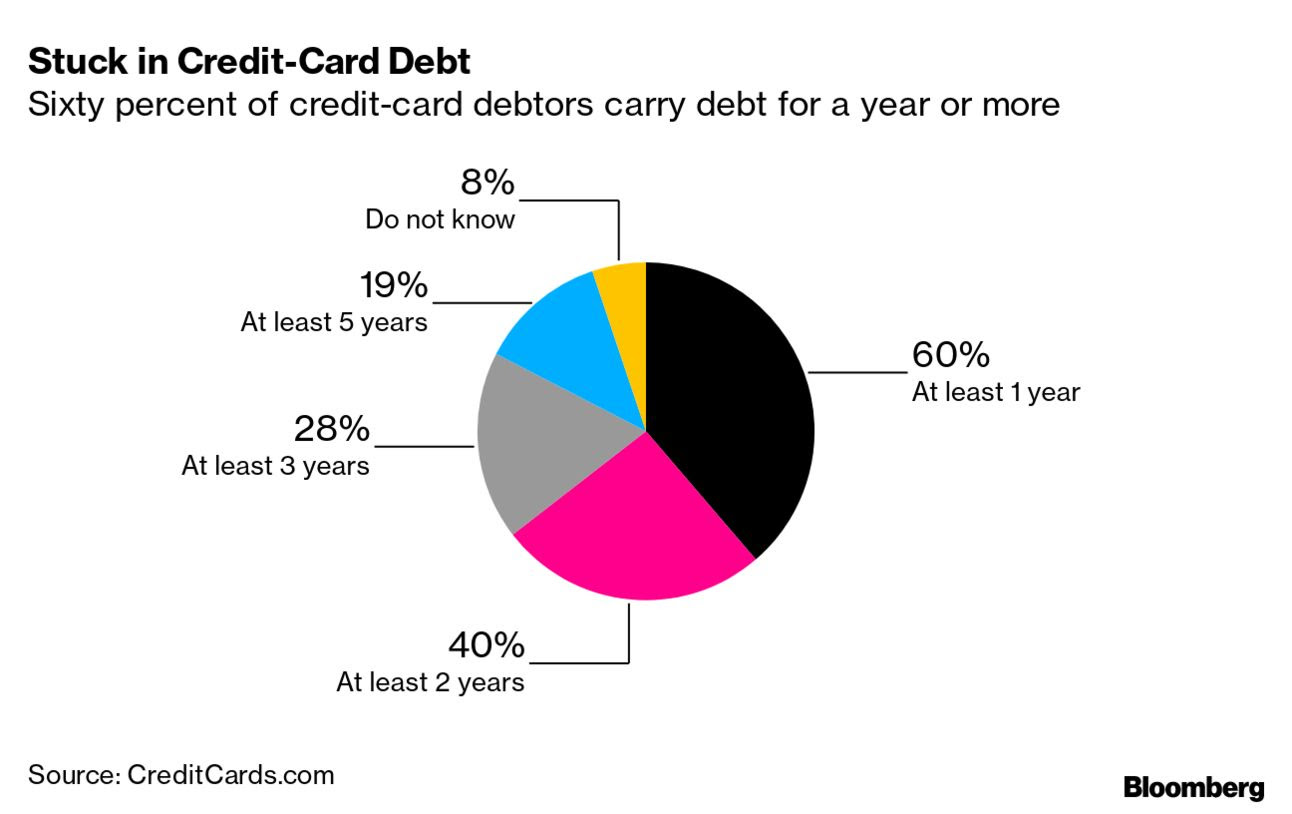
Interest rates have always topped inflation by the end of a Federal Reserve tightening cycle, notes Deutsche Bank’s chief U.S. economist, Matt Luzzetti. Currently, inflation sits several percentage points higher, and Luzzetti says the fed funds rate will need to reach 4.9% by the first quarter of 2023.
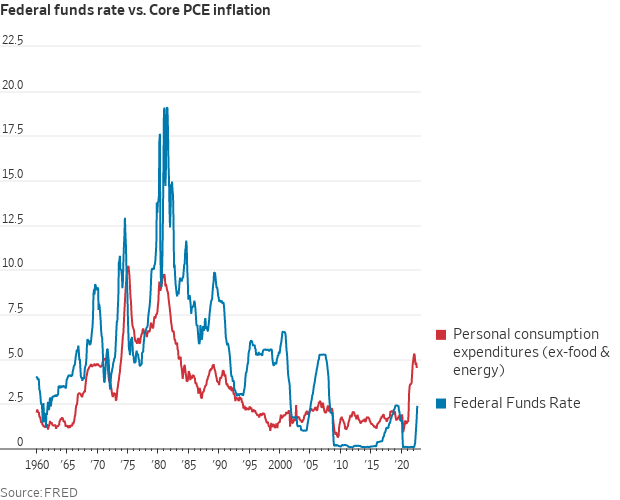
The Internal Revenue Service now has plenty of money. Its next challenge: finding people. The tax agency received $80 billion from Congress this summer to overhaul aging computer systems and strengthen enforcement so the U.S. collects more unpaid taxes. Meeting the objectives will require a top-to-bottom transformation and expansion of the agency, a shift to be accomplished with a yearslong hiring binge for tens of thousands of workers after a long period of agency attrition, the Wall Street Journal reports (link).
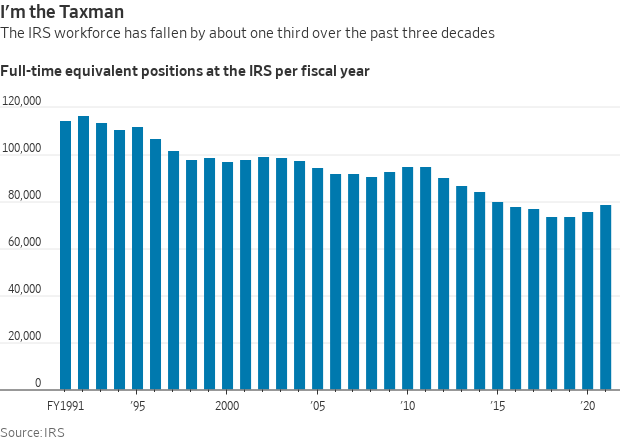
Market perspectives:
• Outside markets: The U.S. dollar index is firmer in early U.S. trading. The yield on the 10-year U.S. Treasury note is fetching 3.492%. The 2-year U.S. Treasury note yield climbed to 3.927%. The inverted 2-year/10-year yield curve is one clue of impending U.S. economic recession. Crude is lower, with U.S. crude around $82.65 per barrel and Brent just over $89 per barrel. Gold and silver futures are, with gold under $1,670 per troy ounce and silver under $19.36 per troy ounce.’
• Dollar’s rise spells trouble for global economies. The U.S. dollar is experiencing a once-in-a-generation rally, a surge that threatens to exacerbate a slowdown in growth and amplify inflation headaches for global central banks. The dollar’s role as the primary currency used in global trade and finance means its fluctuations have widespread impacts. The currency’s strength is being felt in the fuel and food shortages in Sri Lanka, in Europe’s record inflation and in Japan’s exploding trade deficit. In a worrying sign, attempts from policy makers in China, Japan and Europe to defend their currencies are largely failing in the face of the dollar’s unrelenting rise, the Wall Street Journal reports (link).
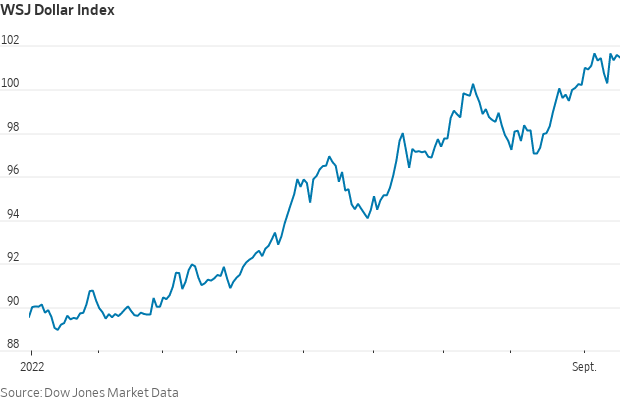
• U.S. electric bills are expected to soar this winter as natural-gas prices continue to climb. Natural gas prices have more than doubled this year, and they are expected to remain elevated for months. The Energy Information Administration anticipates the average residential price of electricity will go up 7.5% in 2022 from 2021. The agency also forecasts record gas consumption this year, in part because power producers are limited in their ability to burn coal instead.
• The number of loaded inbound containers through the Port of Los Angeles dropped by the most since the early days of the Covid-19 pandemic last month (link). But other docks are still going gangbusters: The Port of Savannah announced last week that August was its busiest month ever (link).
• After hitting record highs in early 2022, container shipping shares are in a steady decline. Maersk dropped 10.3% last week — the sixth straight weekly decline — and shares of China’s Cosco were hovering near the lowest since April 2021. The spot market for ocean freight is still in freefall, signaling weaker demand and perhaps an end to the carriers’ record run of profits, according to a recent note (link) from Sea-Intelligence.
• Cotton analyst comments on USDA’s latest cotton acreage/production estimates: “They still are not accounting for all of the failed acres here on the high and rolling plains of Texas. FSA numbers rarely capture all of the failed acres especially early on. There is no requirement for a producer to fail acres at FSA, and it varies among insurance providers if they require a producer to fail acres at FSA. September 15 insurance providers were able to move from a stand count to a boll count when doing appraisals, so there will be many more acres failed on top of what was done earlier in the season.”
• Ag trade: Saudi Arabia purchased 556,000 MT of wheat from unspecified origins. Pakistan tendered to buy 300,000 MT of wheat from unspecified origins. Bangladesh cancelled a tender to buy 50,000 MT of wheat.
• More than a million people in Puerto Rico are without power today after Hurricane Fiona slammed the island with heavy rain and life-threatening flooding. The Category 1 storm came ashore on Sunday with maximum sustained winds of 90 mph and has already dumped 6 to 24 inches of rain in some areas, the National Hurricane Center said. Fiona could bring a total of up to 30 inches of rainfall to Puerto Rico and up to 12 inches to the Dominican Republic, which the storm hit earlier this morning.
• NWS weather: There is a Slight Risk of excessive rainfall over parts of Northern New England through Tuesday morning... ...There is a Marginal Risk of excessive rainfall over parts of California and the Southwest/Southern Rockies through Wednesday morning... ...Temperatures will be 10 to 20 degrees above average over parts of the Central Plains/Middle Mississippi Valley.
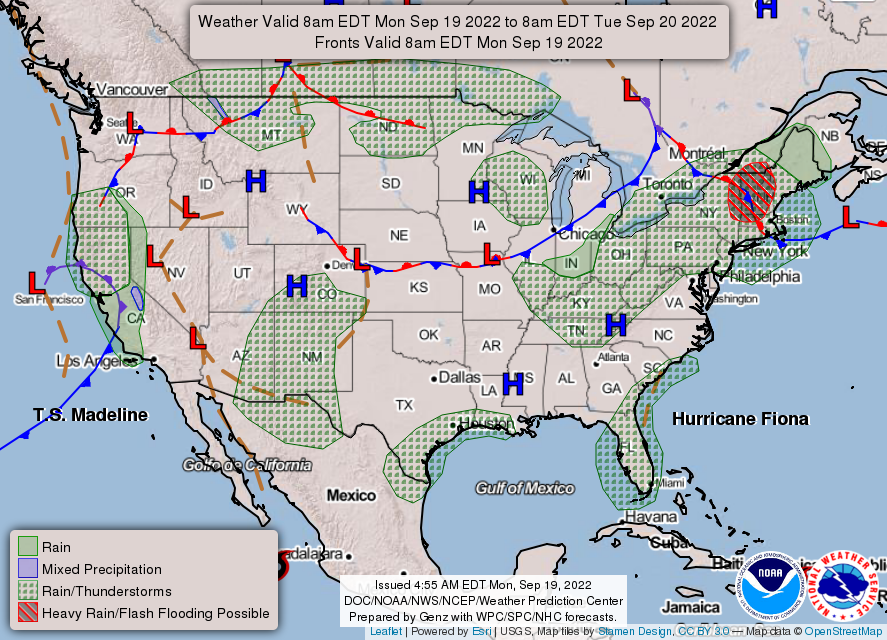
Items in Pro Farmer's First Thing Today include:
• Wheat and corn lower, soybeans mixed overnight
• U.S. crop areas mostly dry, South America will get needed rains
• Ukrainian grain shipments continuing (details in next section)
• Firm raises Russian wheat crop forecast
• China’s central bank steps up cash injections (details in China section)
• Higher cash cattle prices expected
• Cash hog index firmer again
|
RUSSIA/UKRAINE |
— Summary: Russia's troops are setting up a new defensive line in northeastern Ukraine as Kyiv's troops press on with their offensive. In a daily intelligence update, Britain’s Defense Ministry (MoD) said the line will probably be between the Oskil River and Svatove, some 150 kilometers from Kharkiv, Ukraine’s second-largest city. "Russia likely sees maintaining control of this zone as important because it is transited by one of the few main resupply routes Russia still controls from the Belgorod region of Russia," the MoD said. "Russia will likely attempt to conduct a stubborn defense of this area, but it is unclear whether Russia's front line forces have sufficient reserves or adequate morale to withstand another concerted Ukrainian assault," it added.
- Volodymyr Zelenskyy, Ukraine’s president, vowed there would be no “lull” after his country’s recent success in regaining territory lost to Russia. He said Ukrainian forces are preparing for the “next sequence”. Over the weekend they struck several Russian military strongholds in southern Ukraine. Britain’s defense ministry estimated that Russia has lost four jet-fighters in the past ten days; Admiral Sir Tony Radakin, the chief of the defense staff, judged Vladimir Putin, Russia’s president, to be “failing on all of his military strategic objectives.”
- Putin’s energy war with Europe seems to falter. Vladimir Putin’s economic campaign to force European governments to abandon support for Ukraine by sharply curbing their natural-gas supplies looks to be faltering as gas prices fall, Russian government finances deteriorate and the continent sets plans to ease the pressure on households and businesses. Russia’s long-term success in the economic fight with Europe is seen as critical by both sides in deciding the outcome of the conflict in Ukraine. But signs that Putin’s economic strategy is struggling are coinciding with serious reverses on the battlefield, the WSJ reports (link).
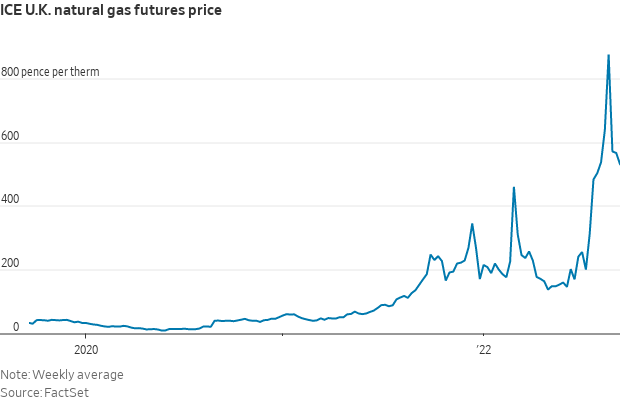
- European Union unleashed an unprecedented punishment on one of its own, signaling that patience has worn out with Hungary —and Prime Minister Viktor Orban’s determination to engage with Russian President Vladimir Putin, while eschewing the democratic values of the bloc. On Sunday, the EU triggered for the first time a process that may withhold 7.5 billion euros ($7.5 billion) earmarked for Hungary unless it takes steps to curb fraud and corruption. EU governments must make the final decision within a month on whether to freeze Hungary’s funding, with the possibility of extending the deadline by as much as two months.
- India’s prime minister, Narendra Modi, publicly criticized Russia’s invasion of Ukraine, telling President Vladimir Putin that “today’s era is not an era of war”. Speaking at the Shanghai Co-operation Organization summit in Uzbekistan, Putin responded that he understood Modi’s concerns. Later the Russian leader said his goals in Ukraine had not changed — the main one being the “liberation” of the Donbas region. He then appeared to threaten to hit more civilian infrastructure.
- President Biden is resisting Ukraine calls for more powerful weapons, the New York Times reports (link), in part because he is convinced that over the past seven months, he has successfully signaled to Russian leader Vladimir Putin that he does not want a broader war with the Russians — he just wants them to get out of Ukraine. The article says a shipment of long-range guided missiles, “which could also give Ukraine new options for striking Crimea, the territory Russia annexed in 2014, would likely be seen by Moscow as a major provocation, Biden has concluded.”
- Biden warns Russia, against using unconventional weapons. Some officials worry that the more cornered Vladimir Putin feels, particularly with recent setbacks from Ukraine’s counteroffensive, the greater the chance that he might turn to an unconventional weapon. The United Nations said it was dispatching a team to assist in the investigation, while the Biden administration warned the Kremlin against using unconventional weapons to reverse the successful counteroffensive by Ukrainian troops. In an interview with the CBS News program “60 Minutes” that aired on Sunday, President Biden said that the United States’ response to any use of such weapons would be “consequential,” though he did not provide details.
- Poland opens new waterway to break Russia dependence. Poland’s leaders celebrated the opening of a new yet unfinished canal on Saturday, which they say will mean their ships no longer must secure Russia’s permission to sail from the Baltic Sea to ports in the Vistula Lagoon. The event was timed to mark 83 years since the Soviet invasion of Poland during World War II. It was intended to demonstrate symbolically that Moscow's say over the economy and development of the area, bordering the Russian-controlled Kaliningrad exclave, had ended. The government says the waterway gives Poland full sovereignty in the northeastern region, which needs investment and economic development. “The idea was to have this waterway opened and not to have to ask permission anymore from a country that is not friendly and whose authorities do not hesitate to attack and subdue others,” Polish President Andrzej Duda said. He said the investment will pay off through the increase in the value of the land around it, through the development of the cities and ports on the lagoon thanks to increased trade, business and tourism.
However, cargo ships cannot use the passage until the approach to the Port of Elblag is deepened. There has been some controversy in Poland over the expense of the project. - Ukraine grain flowing into EU tests European solidarity. Farmers from France to Poland are irked by what they say has been a flood of cheaper Ukrainian imports. Link to details via the Wall Street Journal.
- Ukrainian grain shipments continuing. Through Saturday, a total of 165 ships with 3.7 MMT of agricultural products on board had left Ukrainian ports since Aug. 1 under the grain export deal, the country’s infrastructure ministry said. Another 10 ships carrying 169,300 MT of grain departed Ukrainian ports on Sunday.
- Ukraine keeps its grain crop estimate unchanged. Ukraine expects a 2022 grain crop of 50 MMT to 52 MMT, unchanged from its previous estimate and down from 86 MMT last year, the country’s ag ministry said on Monday. The ministry expects grain exports to total between 5.4 MMT and 5.5 MMT this month, up from 4.5 MMT in August.
|
CHINA UPDATE |
— President Biden told 60 Minutes that the U.S. would defend Taiwan if it were attacked by China. As expected, later the White House “clarified” that its official policy on Taiwan remains one of “strategic ambiguity.” China’s foreign ministry said it “deplores and firmly opposes” the comments. Biden has annoyed China this way at least three times already. If the first was a flub, the fourth cannot be, say some.
— The Chinese megacity of Chengdu exited its lockdown on Monday, with 21 million people allowed to leave their homes and resume most aspects of normal life for the first time since Sept. 1, provided they’re tested regularly for Covid-19.
— China’s central bank steps up cash injections. China’s central bank lowered the borrowing cost of 14-day reverse repos on Monday and increased cash injections to counteract higher demand towards the quarter-end. The People’s Bank of China (PBOC) injected 2 billion yuan ($286.54 million) through 7-day reverse repos and another 10 billion yuan ($1.43 billion) through the 14-day tenor, it said in a statement. PBOC also resumed 14-day operations for the first time since late January, while lowering the interest rate on liquidity tool by 10 basis points to 2.15% from 2.25%. The reduction was a catch-up move to the central bank’s decision in August by cutting some key interest rates, including the 7-day reverse repo rate, to revive credit demand and prop up the sputtering economy.
— China pork imports rose in August. China imported 140,000 MT of pork in August, up 20,000 MT from July but still 50% less than last year. For the first eight months of the year, China imported 1.07 MMT of pork, down 63.6% from the same period last year.
— China installed almost as many robots in its factories last year as the rest of the world, accelerating a rush to automate and consolidate its manufacturing dominance. Shipments of industrial robots to China in 2021 rose 45% compared with the previous year to more than 243,000, according to new data viewed by the Wall Street Journal (link) from the International Federation of Robotics, a robotics industry trade group. China accounted for just under half of all installations of heavy-duty industrial robots last year. Part of the explanation for China’s rapid automation is that it is simply catching up with richer peers. The rapid automation also reflects a growing recognition in China that its factories need to adapt as the country’s supply of cheap labor dwindles and wages rise.
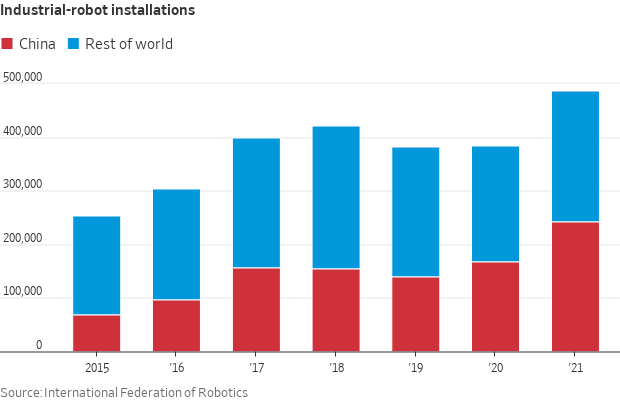
|
TRADE POLICY |
— USTR Tai again defends continued China tariffs, murky on road ahead. U.S. tariffs levied against Chinese products in 2018 were not “punitive” tariffs, according to U.S. Trade Representative (USTR) Katherine Tai, and are not “punishing” China. Tai said the tariffs are just a trade tool. “They can be used in lots of different ways. In some contexts, they are used as sanctions. These are not sanctioning tariffs. The tariffs that were put down in 2018 were really rebalancing tariffs; they are tariffs to try to level the playing field to overcome unfairness that we have seen and the impacts on the U.S. economy. So that is a legal fact, but that is also a fact with respect to policy.”
Regarding the first talks with Taiwan under the Initiative on 21st Century Trade, Tai said she expects negotiations will take place soon.
Tai downplayed the possibility of an “early harvest” of successes under the U.S. Indo-Pacific Economic Framework (IPEF) following the ministers’ meeting last week.
|
ENERGY & CLIMATE CHANGE |
— Eight House Democrats ask Biden to continue oil reserve releases. The Biden administration should continue releasing oil from the U.S. Strategic Petroleum Reserve (SPR) through the end of the year “at a minimum,” according to a letter sent to Biden Friday by eight House Democrats. The letter, led by Rep. Jared Golden (D-Maine), says continued high gasoline prices “coupled with the fact that Russia’s war in Ukraine is unlikely to end in the near future and hurricane season could bring further disruptions to domestic oil production” should be a reason to continue oil releases from reserves. Link for details and letter.
— Electric vehicles took off. Car makers weren’t ready. A WSJ article (link) notes that more buyers are lining up for EVs, catching car companies flat-footed and triggering a race for more batteries, factories and materials. Some highlights:
- A few years ago, auto executives weren’t sure there would be enough buyers for plug-in electric models. Now, they worry they can’t build them fast enough, while they intensify a multibillion-dollar rush to accelerate timelines and bring factories online.
- EVs account for only about 6% of overall U.S. vehicle sales. But that percentage has tripled in the last two years, while sales of other types of vehicles have declined, according to research firm Motor Intelligence. General Motors Co., Ford, Rivian Automotive Inc. and other auto makers say they have waiting lists of longer than a year for their new electric models.
- In July, five of the six fastest-selling vehicles in the U.S. were electrics or plug-in hybrids, which pair a battery with a gas engine, according to data from consumer site Edmunds.com. EVs sold in 19 days on average in July compared with 47 days a year earlier — and went four days faster than internal-combustion vehicles, Edmunds data show.
— A green group turns red. Greenpeace and other environmental groups said they will sue the European Commission unless it revokes the “fake green” status it has awarded to gas-fired and nuclear power stations. The EU’s rules allow investments in such plants to be categorized as climate friendly. Last week the European Parliament had angered climate activists by preserving wood’s designation as a source of renewable energy.
|
LIVESTOCK, FOOD & BEVERAGE INDUSTRY |
— Pork producers list industry priorities during NPPC fly-in. The National Pork Producers Council (NPPC) held its fall Legislative Action Conference Wednesday and Thursday last week, meeting with their members of Congress to discuss pork industry priorities. Over the two-day event, NPPC said its producers asked lawmakers to:
- Trade policy: Press the Biden administration to join the 11-nation Comprehensive and Progressive Trans-Pacific Partnership and to negotiate an Indo-Pacific Economic Framework trade deal that addresses market access for and non-tariff barriers to U.S. products.
- Expand the H-2A visa program to year-round agricultural workers, including packing plant employees. Currently, the visa only allows for temporary, seasonal farm laborers.
- Pass the “Beagle Brigade Act,” authorizing a training center for dogs that can detect animal and plant diseases and pests at the country’s points of entry. Only the Senate must approve the measure; the House passed the bill earlier this year. Producers also asked that the Bureau of Customs and Border Protection agricultural inspection program be fully funded.
- Next farm bill: Fund in next farm bill the National Annual Vaccine and Veterinary Countermeasures Bank, the National Animal Health Laboratory Network, the National Animal Disease Preparedness and Response Program, and the National Veterinary Stockpile. Producers also asked for an increase in funds to help reduce the population of feral swine, which can carry foreign animal diseases.
- Trade promotion: Reauthorize and fund — also through the farm bill — the Market Access and the Foreign Market Development programs to promote U.S. agricultural exports and authorize a USDA catastrophic risk insurance program to help mitigate risks for pork producers.
|
HEALTH UPDATE |
— Covid summary:
- Global Covid-19 cases at 612,052,035 with 6,526,618 deaths.
- U.S. case count is at 95,658,277 with 1,053,420 deaths.
- Johns Hopkins University Coronavirus Resource Center says there have been 612,781,120 doses administered, 224,636,858 have been fully vaccinated, or 68.18% of the U.S. population.
— As a growing number of states move away from Covid-19 restrictions and quarantine measures, President Joe Biden said he believes the pandemic is "over," but acknowledged the U.S. still has a "problem" with the virus. "The pandemic is over. We still have a problem with Covid. We're still doing a lot of work on it… but the pandemic is over," Biden said during an interview on CBS' 60 Minutes. The U.S. gov’t still designates Covid-19 as a Public Health Emergency and the World Health Organization says it remains a Public Health Emergency of International Concern.
Perspective: Observers are already saying Biden may have torpedoed his own request for another $22 billion to combat the coronavirus pandemic for vaccines, testing, and treatments.
— Japan is getting ready to join other top Asia-Pacific destinations in fully reopening to tourism. But the region’s beaches, shopping meccas and cultural sites are finding the return to pre-Covid prosperity is slower than in the U.S. and Europe, in part because would-be Chinese tourists are still largely stuck at home. Government officials in Tokyo said Prime Minister Fumio Kishida was preparing soon to lift entry restrictions and put Japan on par with the U.S. and European nations that generally allow short-term tourists to visit freely without Covid-19 tests.
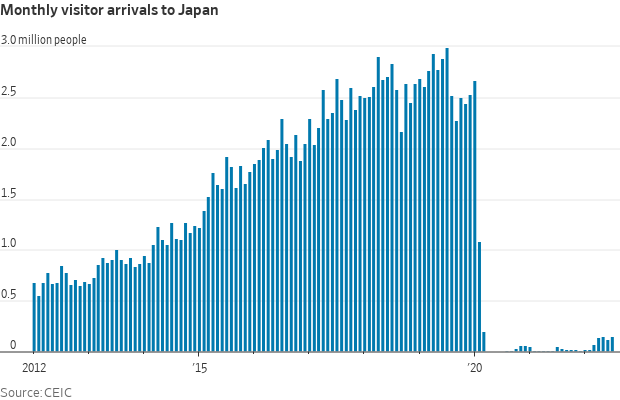
— Cancer-vaccine research. The Covid pandemic has led to the widespread usage of mRNA vaccines, and some believe they hold promise for other treatments as well. Moderna's CEO Stéphane Bancel discusses the company's new Covid-19 vaccine and work on developing a personalized cancer vaccine, at a WSJ Future of Everything event on health (link).
— Monkeypox cases are declining in many areas of the U.S., but the Biden administration is warning that the virus still poses a danger and pushing for lawmakers to approve its multibillion-dollar funding request to combat it. More than 23,000 infections have been confirmed in the U.S. during the outbreak, but the growth has slowed. Cases have dropped about 50% in the past month, according to the Centers for Disease Control and Prevention (CDC), from an average of 440 cases a day on Aug. 16 to 170 cases a day on Sept. 14.
|
POLITICS & ELECTIONS |
— President Joe Biden will decide whether to run for re-election after congressional elections in November. “It’s much too early to make that kind of decision,” Biden said in a 60 Minutes interview on Sunday. “What I’m doing is I’m doing my job. I’m gonna do that job, and within the time frame that makes sense after this next election cycle here, going into next year, make a judgment on what to do.” “Is it a firm decision that I run again? That remains to be seen,” Biden said, according to a transcript of the interview. After interviewer Scott Pelley noted that Biden is the oldest president ever, Biden joked, “pretty good shape, huh?”
The president also pointed to election-law requirements that take effect once a candidate officially declares candidacy as reason to wait on a decision, saying that “all of a sudden a whole range of things come into play” if he were to make his intentions official.
— Majority of Latino voters out of GOP’s reach, new poll shows, despite recent GOP gains. A New York Times/Siena College poll found Democrats faring far worse than they have in the past with Hispanic voters. But overall, the party has maintained a hold on the Latino electorate. Link for details.
— Sen. Lindsey Graham (R-S.C.) on his national 15-week abortion ban bill, on Fox News Sunday: “I’m pro-life, even in an election year. And to those whose suggest that being pro-life is losing politics, I reject that … To my Republican colleagues: Now’s the time to stand up and be counted. The pro-life movement is counting on you.”
|
CONGRESS |
— Congress today:
- The House convenes at noon for morning hour debate and 2 p.m. ET for legislative business, with votes postponed until 6:30 p.m. ET
- The Senate convenes at 3 p.m. ET to resume consideration of the nomination of Florence Pan to be U.S. Circuit Judge for D.C., with a cloture vote on the nomination scheduled for 5:30 p.m. ET.
|
OTHER ITEMS OF NOTE |
— Auction of Ruth Bader Ginsburg's personal items raises nearly $517,000 for charity. An auction of 76 of late Supreme Court Justice Ruth Bader Ginsburg's personal items fetched nearly $517,000 for a charity beloved by the former justice. Among the items are a gavel that sold for $20,400, black lace gloves that sold for $16,575, opera glasses that sold for $10,837.50, and a cake topper in Ginsburg's image that sold for $3,187.50. One of Ginsburg's classic judicial collars, a gold-colored beaded collar that she kept in her Supreme Court chambers, sold for $176,775. Many of her other collars were donated to the Smithsonian Museum.
|
KEY LINKS |
WASDE | Crop Production | USDA weekly reports | Crop Progress | Food prices | Farm income | Export Sales weekly | ERP dashboard | California phase-out of gas-powered vehicles | RFS | IRA: Biofuels | IRA: Ag | Student loan forgiveness | Russia/Ukraine war, lessons learned | Election predictions: Split-ticket | Congress to-do list |






